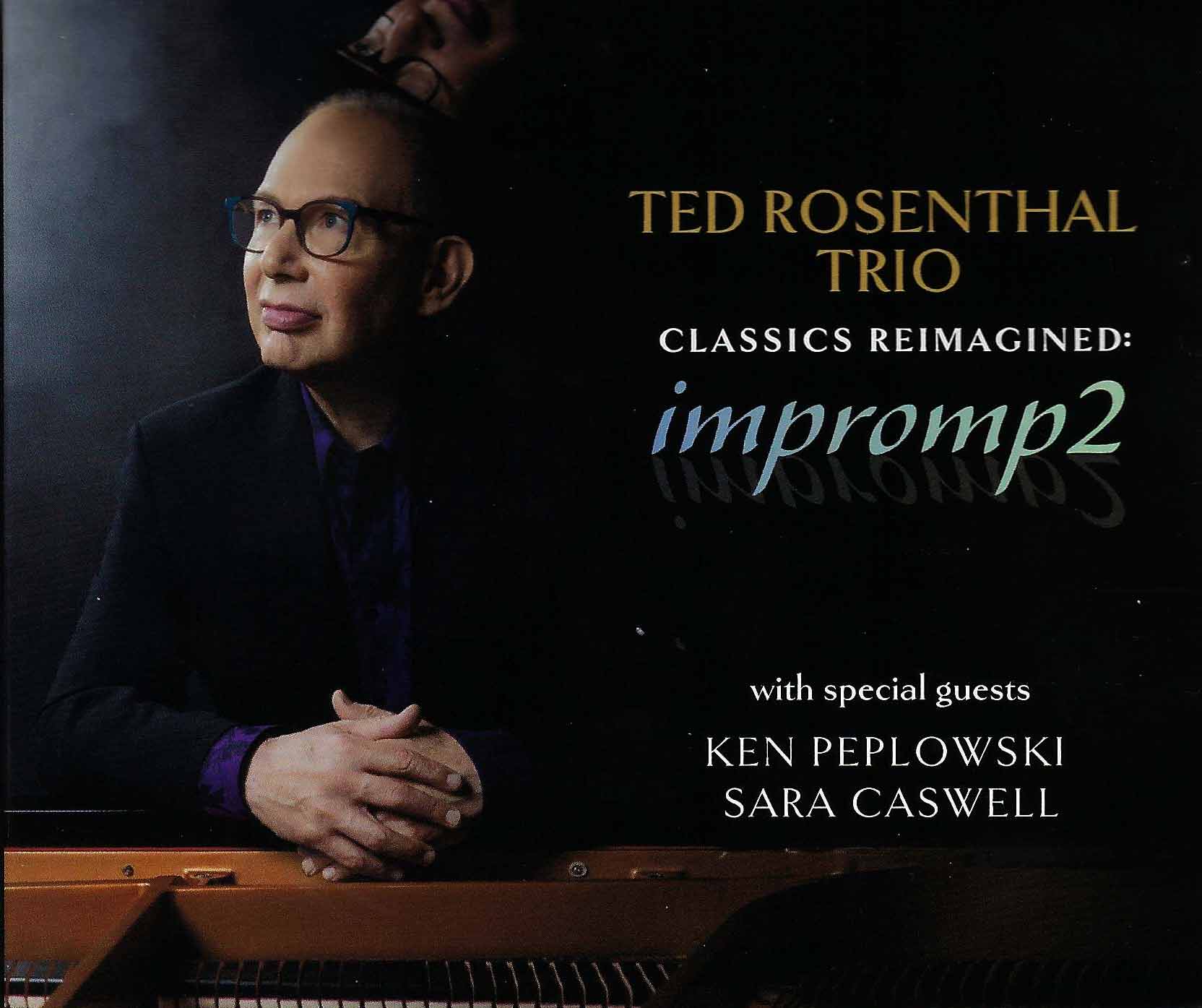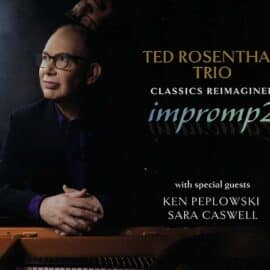| Jazz |

Ted Rosenthal’s “Classics Reimagined: impromp2”, When Jazz Rediscovers the Classical Soul
There’s no shortage of ideas, or personality, in Ted Rosenthal’s new album, Classics Reimagined: Impromp2. What first caught my attention were the names of Sarah Caswell and Ken Peplowski, two artists I’ve written about earlier this year, now reunited under Rosenthal’s direction. Both are masters of nuance: Caswell’s violin sings with lyric intelligence, while Peplowski’s clarinet always seems to find the emotional center of a phrase. Together, they join Rosenthal in a project that feels both daring and inevitable, an exploration of classical masterpieces viewed through the lens of contemporary jazz.
In Rosenthal’s hands, these familiar works by Dvořák, Rachmaninoff, Beethoven, and Satie acquire entirely new flavors. His jazz arrangements are not content to decorate; they transform. The pieces become fluid, alive, elastic, bridging two centuries of music-making in ways that feel natural rather than forced. What’s most striking is the emotional clarity that emerges. The musicians, visibly and audibly invested in every bar, pour their hearts into this reimagining so thoroughly that, even knowing many of these works intimately, I sometimes struggled to recognize them. That’s how you know the challenge has been brilliantly met.
A three-time recipient of National Endowment for the Arts grants, Ted Rosenthal has long occupied a unique place at the intersection of jazz and classical music. A pianist of extraordinary technical command and deep lyricism, he has performed and recorded widely, composing not only jazz works but large-scale concert pieces. His jazz opera Dear Erich, commissioned and premiered by the New York City Opera in 2019, remains a landmark. Critics hailed it as a deeply human achievement: “Captivating… tells a true and moving story. Rosenthal’s score expresses regret and fragility, with scenes that open into dazzling jazz,” wrote Anthony Tommasini in The New York Times. “It leaves the listener ready to applaud with abandon,” added David Salazar in Opera Wire. Since its debut, Dear Erich has been performed across the U.S. and Europe, confirming Rosenthal’s ability to move between genres with both humility and authority.
That same wisdom, that same blend of intellect and heart, radiates throughout Classics Reimagined: Impromp2. Rosenthal approaches each classical piece not as a relic to be preserved, but as a living organism to be reinterpreted. His perspective is that of a composer who loves great writing, someone who can locate, within each score, the precise thread that can be pulled, stretched, and woven into something new. The result is not a crossover gimmick but an act of genuine renewal. The music plunges deep into a jazz idiom that only Rosenthal could define, personal, harmonically rich, full of narrative surprise.
And make no mistake: this is an album to be heard in full, on a proper CD. The physical medium matters here. It allows the listener to perceive the breadth of the arrangements, the warmth of tone, the architecture of sound. Every detail counts. Rosenthal’s orchestrations are so clear, so intelligently layered, that listening becomes an education in itself. For students of music, or simply attentive ears, Classics Reimagined is practically a master class in how to let structure and spontaneity dance together without either one dominating the other.
Musicians like Ted Rosenthal are both rare and essential. They remind us that virtuosity need not mean excess, that intelligence can coexist with feeling. His artistry brings a kind of serenity to the act of listening, a quiet conviction that beauty still matters, that sincerity is still possible. In an age of noise, Rosenthal’s restraint feels almost radical.
One of the album’s high points is his reimagining of Satie’s “Je te veux.” A piece often trivialized by overexposure and misinterpretation, it’s here restored to its true nature: tender, romantic, haunting. Rosenthal and his ensemble read it not as a waltz of charm but as a confession of longing. The harmonic shifts are subtle yet revelatory; Caswell’s violin glides with a tone both fragile and luminous. You sense that Rosenthal understands Satie not as an eccentric minimalist, but as a poet of emotion. It’s easy to imagine Satie himself, listening from some distant café, nodding in approval at this elegant, introspective transformation that betrays nothing of the original spirit.
Elsewhere, Beethoven and Rachmaninoff are treated with equal respect and imagination. Their familiar melodies are refracted through Rosenthal’s jazz vocabulary, extended harmonies, rhythmic elasticity, a conversational flow that keeps each track alive with discovery. The music never feels trapped in homage; it breathes, it questions, it evolves.
By the time the album closes with one of Chopin’s most beloved pieces, the listener has traveled far. What remains is not the astonishment of novelty but the quiet satisfaction of having seen something old made new again.
There’s a sense, too, that Rosenthal is offering a kind of bridge, not only between genres, but between modes of listening. His Classics Reimagined series suggests that the true meeting point of jazz and classical music is not in style or form, but in spirit: in curiosity, in risk-taking, in the pursuit of beauty as something endlessly renewable.
In the end, this album doesn’t seek to dazzle or to impress. It invites. It speaks softly, but with authority. And it leaves the listener, this listener, at least—with gratitude: for the clarity of its ideas, the sincerity of its emotions, and the simple joy of hearing musicians play not to show what they can do, but to show what music can still be.
Ted Rosenthal can be proud, of his vision, his ensemble, and this luminous conversation between centuries.
Thierry De Clemensat
Member at Jazz Journalists Association
USA correspondent for Paris-Move and ABS magazine
Editor in chief – Bayou Blue Radio, Bayou Blue News
PARIS-MOVE, November 12th 2025
Follow PARIS-MOVE on X
::::::::::::::::::::::::
Musicians :
Ted Rosenthal, piano
Noriko Ueda – bass
Quincy Davis – drums (1,2,6,8,10)
Tim Horner – drums (3,4)
Ken Peplowski clarinet
Sara Caswell Violin (5,9,10)
Track Listing :
Waltz in C-Sharp Minor
Slavonic Dance
Mazurka in A Minor
The Old Castle (feat. Ken Peplowski)
Vocalise (feat. Sara Caswell)
Allegretto from Symphony No. <3>
“Pathetique” Sonata, 2nd Movement
“Pathetique” Sonata, 3rd Movement
Salut D’Amour (feat. Sara Caswell)
Je Te Veux (feat. Sara Caswell)
Waltz in A-Flat Major (feat. Ken Peplowski)

